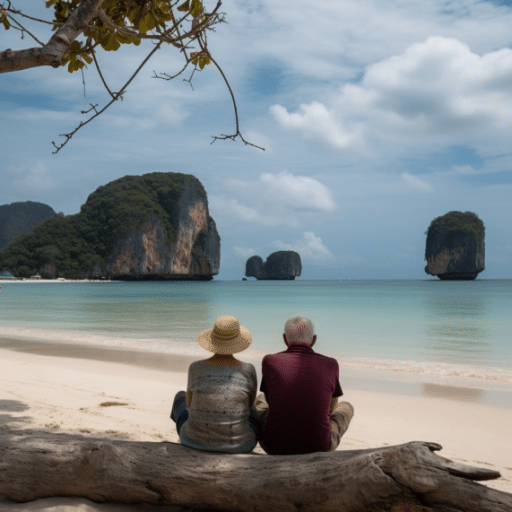(This article was last updated on December 30, 2023.)
This article is meant for those wondering is Thailand still a good place to retire? We will walk you through the requirements to retire in the country, the pros and cons of living in it, what you need to know before you move, and the best places to live in, among other things.
Thailand has long been a popular destination for retirees, offering a low cost of living, tropical weather, and friendly locals. In recent years, however, the country has become increasingly popular with tourists and digital nomads, leading to concerns about whether it is still a viable option for those looking to retire there.
If you are looking to invest in better alternatives, or want a second opinion, you can contact me on advice@adamfayed.com or use the chat function below.
There are still many reasons why Thailand remains a good place to retire. The cost of living is still relatively low, with monthly rent for a one-bedroom apartment in the country’s capital Bangkok costing roughly 10,632 baht to 22,329 baht (or 309 US dollars to 650 USD) depending on the area, according to Numbeo.
Besides, the locals are still friendly and welcoming, making it easy to get by without speaking Thai.
However, it is important to be aware of the increased living costs in certain areas, as well as the increased competition for jobs and rental properties. Despite the challenges, many retirees still find Thailand a great place to live.
What are the requirements to retire in Thailand as an expat?
Thailand is a popular destination for retirees. The country has a lot to offer, including great weather, affordable healthcare, and a laid-back lifestyle. If you’re thinking about retiring in Thailand, there are a few things you’ll need to take into account.
Here are the requirements to retire in Thailand as an expat:

Cost of Living in Thailand for Retirees
Retiring in Thailand offers an attractive proposition, but a key factor that often tops retirees’ lists of considerations is the cost of living. Let’s delve deeper into the cost of living in Thailand for retirees and explore the various facets that impact their financial well-being.
Affordable Housing Options
One of the most significant advantages of retiring in Thailand is the availability of affordable housing options. Whether you prefer city living, beachfront properties, or serene countryside homes, Thailand has something for every retiree’s taste and budget.
Renting vs. Owning
Thailand allows retirees to choose between renting and owning property. Renting can be cost-effective, with reasonable monthly rates for apartments and houses.
On the other hand, property ownership provides a long-term investment opportunity, but it comes with additional expenses like maintenance and property taxes. Weighing these options is essential to make an informed decision that aligns with your financial goals.
Healthcare Costs
Thailand is renowned for its world-class healthcare system, which is both affordable and of high quality. Many retirees are drawn to Thailand for its excellent medical facilities and medical tourism industry.
Health Insurance Considerations
While healthcare costs are generally lower in Thailand compared to Western countries, it’s crucial to consider health insurance.
International health insurance plans tailored for expatriates and retirees in Thailand provide coverage for medical expenses and emergencies. Factoring health insurance into your retirement budget ensures you have peace of mind in case of unexpected medical needs.
Daily Living Expenses
The day-to-day cost of living in Thailand is often lower than in many Western countries. From dining at local restaurants to grocery shopping, retirees can enjoy affordable options without compromising on quality.
Transportation and Commuting Costs
Thailand’s public transportation systems, such as buses and trains, offer cost-effective ways to get around. Additionally, many retirees find that owning a motorbike or using ride-sharing services is a budget-friendly way to navigate the country.
Entertainment and Leisure Activities
Thailand’s rich cultural heritage and natural beauty provide retirees with numerous affordable leisure activities. Exploring ancient temples, enjoying local festivals, and discovering pristine beaches are all within reach without straining your retirement budget.
Budgeting and Financial Planning
To ensure a comfortable retirement in Thailand, retirees should establish a well-defined budget and financial plan.
This plan should account for all living expenses, including housing, healthcare, transportation, and leisure activities. Having a clear financial roadmap helps retirees manage their funds and make the most of their retirement years.
Currency Exchange Rates
Currency exchange rates play a significant role in the cost of living for expatriates and retirees. Thailand’s currency, the Thai Baht, can fluctuate in value against other major currencies.
Monitoring exchange rates and exploring strategies for favorable conversions can optimize retirees’ financial situations.
Banking and Financial Services
Thailand has a well-developed banking and financial services sector, which caters to retirees’ needs. Understanding the banking system, fees, and currency exchange options is crucial for efficient financial management during retirement.
You’ll need to be age 50 or older
To retire in Thailand as an expat, you’ll need to be at least 50 years old. This is because the Thai government offers special retirement visas for people over 50. If you’re not yet 50, you can still retire in Thailand, but you’ll need to apply for a different type of visa.
You’ll need to have a retirement fund
In order to retire in Thailand, you’ll need to have a retirement fund. This can be in a pension, annuity, or investment account. The amount you’ll need will depend on your lifestyle and spending habits. However, most experts recommend having a fund that will cover at least two years of your living expenses.
You’ll need to have proof of income
If you want to retire in Thailand, you’ll need to show proof of income. This can be in the form of a pension statement, annuity contract, or investment account statement. You’ll also need to show that you have enough money to support yourself during your retirement.
You’ll need to get a retirement visa
If you want to retire in Thailand, you’ll need to get a retirement visa. This is a special type of visa that’s specifically for retirees. In order to get a retirement visa, you’ll need to meet certain requirements, such as being over the age of 50 and having a retirement fund.
You’ll need to speak Thai
In order to retire in Thailand, you’ll need to be able to speak Thai. This is because the majority of Thais don’t speak English. You can find many who speak English at tourist spot locations, but if you go outside of it, it will be better to at least have some basics with you.
If you don’t know how to speak Thai, you can take classes at one of the many language schools in Thailand.
Prepare for a different lifestyle
Thailand is very different country from the United States. If you’re not prepared for the change, you may struggle to adjust. Be prepared for a slower-paced lifestyle, spicy food, and humidity.
Tax Considerations for Retirees in Thailand
Retiring in Thailand offers a myriad of advantages, but one crucial aspect to consider is the tax landscape.
Understanding the tax considerations for retirees in Thailand is essential for effective financial planning and ensuring that your retirement funds stretch as far as possible. In this section, we’ll explore the tax-related aspects of retiring in the Land of Smiles.
Personal Income Tax in Thailand
Thailand operates on a progressive tax system for personal income, which means that your tax rate increases as your income rises. As a retiree, your taxable income may include pensions, rental income, and other sources of income.
Tax Rates and Deductions
Currently, Thailand has several tax brackets with varying rates. The tax rates range from 5% to 35% for different income levels. However, retirees may be pleased to know that certain deductions and exemptions can reduce their taxable income.
One significant tax benefit for retirees is the personal allowance. Retirees aged 65 and older are entitled to a higher personal allowance than younger individuals, resulting in lower taxable income. This allowance can significantly reduce the tax burden for retirees.
Property Tax in Thailand
When considering retirement in Thailand, property ownership is often part of the plan. Whether you choose to buy a house or condominium, it’s important to understand the property tax implications.
Property Tax Rates and Regulations
Property tax in Thailand is relatively low compared to many Western countries. Property owners are subject to an annual tax based on the assessed value of their property. The rates are typically reasonable, making property ownership an attractive option for retirees.
Additionally, Thailand has specific property tax incentives for retirees. For example, if you purchase a condominium in a designated Special Business Zone, you may be eligible for reduced property taxes for a certain period.
These incentives can further enhance the affordability of owning property in Thailand during retirement.
Inheritance and Gift Tax
Inheritance and gift tax are important considerations for retirees who want to pass on their assets to heirs. Thailand does have inheritance and gift tax laws in place.
Exemptions and Thresholds
The good news for retirees is that Thailand provides exemptions and thresholds for inheritance and gift taxes.
Currently, there are no inheritance taxes on assets passed down to direct descendants, such as children and spouses. However, other beneficiaries may be subject to inheritance tax if the value of the assets exceeds the threshold.
Understanding these tax regulations and planning your estate accordingly can help you preserve your assets for your loved ones.
International Tax Treaties
Thailand has entered into double taxation agreements (DTAs) with several countries to prevent double taxation of income. These DTAs can be advantageous for retirees who have income from multiple sources or who split their time between Thailand and another country.
Impact on Retirement Income
The existence of international tax treaties can have a significant impact on how your retirement income is taxed. For example, a tax treaty may determine which country has the primary taxing rights over your pension income, potentially reducing your overall tax liability.
Before retiring in Thailand, it’s advisable to consult with a tax professional who specializes in international taxation to ensure that you take full advantage of any applicable tax treaties.
Thailand Retirement Visa Requirements
Retiring in Thailand is an enticing prospect for many, but to turn this dream into reality, you must navigate the intricacies of Thailand’s retirement visa requirements.
In this section, we’ll take a deep dive into the specific requirements and processes involved in obtaining a retirement visa, shedding light on the steps you need to take to make your retirement in the Land of Smiles a reality.
Minimum Age and Eligibility
To qualify for a retirement visa in Thailand, you must meet several eligibility criteria. One of the most fundamental requirements is age. You need to be at least 50 years old to be eligible for this visa category. This age criterion ensures that retirees are the primary beneficiaries of this visa option.
Proof of Financial Means
Another critical aspect of obtaining a retirement visa is demonstrating that you have the financial means to support yourself during your retirement years in Thailand. The Thai government typically requires retirees to prove their financial stability through one of the following methods:
Minimum Monthly Income:
One option is to provide evidence of a consistent monthly income that meets the specified minimum threshold.
As of the latest information, the Thai government requires retirees to have a monthly income equivalent to at least 65,000 Thai Baht (THB). This income can come from various sources, including pensions, annuities, or other regular payments.
Bank Deposit:
Alternatively, you can meet the financial requirement by depositing a specific amount of money in a Thai bank account.
Currently, the minimum required bank deposit is 800,000 THB. This amount must remain in your Thai bank account for a specified period, usually at least two months before applying for the retirement visa.
Proof of Pension or Retirement Savings:
If you have a pension or retirement savings, you can provide documentation that demonstrates your financial capability. This may include pension statements, investment account statements, or other financial documents that verify your ability to support yourself in Thailand.
Criminal Background Check
As part of the retirement visa application process, you may be required to provide a criminal background check from your home country.
This background check is conducted to ensure the safety and security of Thailand and its residents. It’s essential to prepare this documentation in advance to avoid delays in your visa application.
Health Insurance Requirement
In recent years, Thailand has introduced a health insurance requirement for retirees applying for a retirement visa.
As of the latest information, retirees must obtain health insurance coverage that meets specific criteria set by the Thai government. This requirement aims to ensure that retirees have access to adequate healthcare while residing in Thailand.
Mandatory Health Insurance
Retirees must obtain health insurance that provides coverage for medical expenses in Thailand, with a minimum coverage amount specified by the authorities. This requirement underscores the importance of retirees’ access to quality healthcare during their stay in Thailand.
You’ll need to have a plan
Retirement in Thailand is a big decision. You’ll need to have a solid plan before you make a move. This includes figuring out where you’re going to live, how you’re going to support yourself, and what you will do with your time.
Also, be sure to research all of the different aspects of life in Thailand so you know what to expect.
Pass a criminal background check
As with any other country, to retire in Thailand, you will have to pass a criminal background check. This ensures that you have no bad record and are not associated with any illegal activities.
Thinking about retiring in Thailand? Well, you may need to outweigh the pros and cons before making a decision. Thailand is a great place to retire, with its low cost of living, beautiful beaches, and relaxed lifestyle.
What are the pros of retiring in Thailand?
For some, retiring in a foreign country is an attractive option. And for a good reason – to retire in Thailand has many benefits, including:
Friendly People and a Rich Culture
This is probably the number one reason retirees choose to move to Thailand. The people are incredibly friendly and welcoming even to foreigners. In fact, it’s often said that the Thai people are some of the friendliest in the world.
There’s also a rich culture to explore, from the food and temples to the music and dance.
Thai food is a mix of spicy and sweet flavors, with lots of fresh vegetables and fragrant herbs. Restaurants are serving Thai food in every town and city in Thailand, so you’ll never run out of options. Besides, it’s cheap to eat out in Thailand.
Stunning Natural Beauty
From the beaches to the jungle, Thailand is a country with incredible natural beauty. And it’s not just the famous spots like Phuket and Phi Phi Island that are worth seeing. There are gorgeous islands and coastal towns all up and down the country. Also, the inland is full of lush jungle, waterfalls, and rice paddies.
Thailand is a nature lover’s paradise. Meanwhile, the cities are filled with colorful temples and lively markets.
Warm Weather All Year Round
If you’re looking to escape the cold winters, Thailand is the place for you. The temperature averages 24-33 degrees Celsius, making it a perfect retirement destination. Moreover, there’s no hurricane season or other extreme weather.
This is ideal for retirees who want to spend their days outdoors. The beaches are stunning, and there are plenty of activities to keep you busy, from swimming and diving to hiking and golfing.
Affordable Healthcare
One of the main concerns people have about retiring abroad is healthcare. But Thailand has some of the best healthcare in Southeast Asia, and it’s very affordable. The cost of medical care is a fraction of what you would pay in developed countries like the United States or Canada.
In addition, there are plenty of hospitals and clinics that cater to foreigners. That’s why Thailand is a popular destination for retirement medical tourism.
That being said, it’s still always a good idea to have travel insurance in case of an emergency.
Safety
It’s safe to go to and live in Thailand. Of course, there are always safety issues whenever you go.
In addition, political upheaval and occasional violence impact several regions of Thailand. Travelers and expats should take care and stay away from any big meetings or protests in the southern regions of the nation, where these locations tend to be concentrated.
Thailand has a low violent crime rate, but visitors in popular destinations like Bangkok and Phuket should be aware of the increased risk of petty theft and frauds. Pickpockets are common in busy places and on public transit, so tourists and expats should be on the lookout at all times.
A Relaxed Lifestyle
For many retirees, one of the main goals is to find a place with a relaxed lifestyle. And that’s exactly what you’ll find in Thailand. From the laid-back attitude of the locals to the easy-going lifestyle, Thailand is a great place to relax and unwind. Plus, there’s never a shortage of things to do, whether exploring the culture, relaxing on the beach, or partying in the nightlife districts.
The pace of life in Thailand is much slower than in developed countries, which can be a pro or a con, depending on your personal preferences.
Cost of Living
One of the biggest pros of retiring in Thailand is the low cost of living.
You can live quite comfortably on a budget of 1,500 USD per month. This includes rent, food, transportation, and other expenses. In fact, Thailand is often touted as one of the most affordable places to retire in the world.
A meal can be as low as 80 baht or 2 USD. Without taking into account the money reserved for rent, a single person can live off 19,207 baht or 561 USD in the country, while a family of four needs 68,255 baht or 1,995 USD.
Retirement Investment Opportunities in Thailand
When considering retiring in Thailand, it’s essential to not only focus on the lifestyle and cultural aspects but also to explore the potential investment opportunities that the country offers.
In this section, we will delve deeper into the various retirement investment opportunities available to retirees in Thailand.
Real Estate Investment
One of the most prominent investment options for retirees in Thailand is real estate. The country’s property market has been attractive to both local and foreign investors for years. Here are some key points to consider:
Property Ownership Regulations
Foreigners can own condominiums in Thailand, but when it comes to land and houses, there are specific regulations to navigate. Understanding the legal requirements for property ownership is essential to avoid potential pitfalls.
Rental Income Potential
Thailand’s tourism industry has created a robust rental market. Many retirees invest in properties for rental income, especially in tourist hotspots like Phuket and Pattaya. The potential for rental returns can be an attractive option to supplement retirement income.
Stock Market Investments
Thailand has a well-established stock market known as the Stock Exchange of Thailand (SET). Retirees can consider investing in Thai stocks, either directly or through mutual funds. Here’s what you need to know:

Diversification Opportunities
Investing in Thai stocks can provide diversification to your investment portfolio. The SET includes companies from various sectors, allowing retirees to spread their investments across different industries.
Currency Risks
Investing in foreign stocks exposes retirees to currency exchange rate risks. Changes in exchange rates can affect the value of investments. It’s crucial to assess and manage these risks when considering stock market investments in Thailand.
Fixed-Income Investments
For retirees seeking a more conservative approach, fixed-income investments in Thailand can be a viable option. Thai bonds and fixed-income securities offer stability and regular income. Consider the following:
Government and Corporate Bonds
The Thai government and corporations issue bonds, providing investors with opportunities to earn interest income. Government bonds are generally considered low-risk investments.
Retirement Income Stream
Fixed-income investments can serve as a reliable income stream during retirement, helping retirees cover their living expenses and enjoy a comfortable lifestyle.
Business Ventures
Some retirees choose to start or invest in businesses in Thailand. This option allows retirees to actively participate in the local economy. Here are some aspects to consider:
Business Regulations
Navigating the legal and regulatory requirements for starting or investing in a business in Thailand is essential. Seek legal advice and ensure compliance with local laws.
Market Research
Thorough market research is crucial to identify business opportunities and assess the potential for success. Understanding the local market and consumer behavior is key.
Precious Metals and Commodities
Investing in precious metals like gold and commodities such as oil and agriculture products can be an alternative investment strategy for retirees. Here’s what you should know:
Portfolio Diversification
Including precious metals and commodities in your investment portfolio can provide diversification and serve as a hedge against inflation and economic uncertainty.
Market Volatility
Commodity markets can be volatile, and the prices of precious metals can fluctuate. Retirees should carefully evaluate their risk tolerance before considering such investments.
What are the cons if you retire in Thailand?
Language Barrier
Expats living in Thailand for a while will agree that learning Thai can be a difficult task. The language barrier can often be a frustrating experience, especially if you are not used to it. While some expats choose to learn the basics of the language, others may find that they struggle with communication, which can be a hindrance when it comes to daily life.
Weather
Thailand is known for its tropical climate, which can be quite hot and humid, especially during the summer months. This can be a tough adjustment for those coming from cooler climates, and it can be difficult to stay cool and comfortable. Additionally, the rainy season (typically June-October) can bring heavy rains and flooding, disrupting travel and daily life.
Healthcare
Thailand has a limited healthcare system, which can be difficult to access and is often lower quality than what expats may be used to. In addition, the cost of healthcare can be quite high compared to other countries in the region. This can be a major downside for those considering retiring in Thailand.
Cost of Living
The cost of living in Thailand is relatively high compared to other countries in Southeast Asia, such as Vietnam or the Philippines. This is due in part to the high cost of rent, food, and transportation in Thailand. Additionally, many goods and services are subject to a 7% VAT (value-added tax), making everyday expenses quite expensive.
According to PwC, both Thai citizens and foreigners who work in the country are subject to income tax, which is imposed regardless of where the income is paid.
Meanwhile, for a resident who generates income outside of Thailand, a tax is due in the calendar year in which it is received in the country.

Things Expats Need to Know Before Retiring in Thailand
As of today, retiring in Thailand is a great option for retirees from all over the world. The country has much to offer, including a rich culture, delicious food, and affordable living expenses.
However, before deciding to retire in Thailand, there are several things expats should know:
1. Learn the Language
If you plan to retire in Thailand, you must learn at least some basic Thai. Not only will this make everyday life much easier, but it will also help you feel more connected to your new community. There are plenty of resources available to help you learn Thai, so there’s no excuse not to get started!
2. Familiarize Yourself with the Culture
Thailand is a fascinating country with a rich culture worth getting to know. Be sure to do some research before making a move, so you can better understand the customs and traditions of Thai people. This will help you feel more comfortable in your new home and avoid cultural misunderstandings.
3. Get Your Finances in Order
Retiring in Thailand is a great way to stretch your retirement savings, but it’s still important to make sure you have everything in order before making a move. Make sure you understand how your pension or other retirement income will be taxed, and research the cost of living in Thailand to budget accordingly.
4. Find the Right Place to Live
One of the best things about retiring in Thailand is the many wonderful places to choose from. Whether you’re looking for a bustling city or a quiet beach town, you’ll find somewhere that’s perfect for you. Do your research and take your time to find the perfect place to call home.
5. Stay Healthy and Active
Retiring in Thailand is the perfect opportunity to focus on your health and wellness. There are plenty of great options for staying active, from hiking and biking to swimming and yoga. And with its delicious and healthy food, Thailand is a great place to eat well and get in shape.
6. Make Friends and Connections
One of the best things about retiring in Thailand is meeting new people from all over the world. Get involved in your local community, attend social events, and join clubs and groups that interest you. You’ll soon have a network of friends to help make your retirement even more enjoyable.
7. Enjoy the Good Life
Thailand is a beautiful country with a relaxed and welcoming culture. It’s the perfect place to enjoy your retirement years in style. However, it’s important to remember that things can sometimes be different than what you’re used to, so it’s important to be prepared for anything. With a little planning and research, you can have the retirement of your dreams in Thailand.
Is Thailand Still a Good Place to Retire?
The COVID-19 pandemic has led many people to rethink their retirement plans. For some, that means staying put in their home country. But for others, it’s an opportunity to relocate to a place with a lower cost of living and better weather.
Thailand has long been a popular destination for retirees. According to the pros and cons above, it seems like Thailand is still a great place to retire, especially if you’re healthy and willing to take some precautions.
So, if you’re on the fence about whether to retire in Thailand, go ahead and give it a try! Just remember to take all necessary measures to keep yourself safe and healthy. And if things don’t work out, don’t worry – there are plenty of other great retirement destinations.
What are the best places to retire in Thailand?
Thailand is one of the most popular tourist destinations in the world, and it’s no wonder why. With its beautiful beaches, delicious food, and friendly people, it’s a great place to visit. But what about living there? Is Thailand still a good place to retire?
The answer is yes – Thailand is an excellent choice for retirement. Here are the five of the best retirement locations/communities in Thailand.
Bangkok
As the capital city of Thailand, Bangkok is a great place to retire. It’s a cosmopolitan city with plenty to do. There are plenty of apartments and condos available for rent, and the public transportation is excellent. Additionally, Bangkok has a large expat community, so you’ll never feel alone.
A family of four needs 78,776 baht or 2,303 USD to afford to live in the city. That cost is still exclusive of rent that can go between 10,614 baht and 22,269 baht (310 USD to 651 USD), depending on whether it’s located inside or outside the main city.
If you’re retiring in Bangkok alone, you must have at least 22,023 baht or 644 USD to afford monthly living expenses. This cost is exclusive of rent.
Chiang Mai

If you’re looking for a more laid-back retirement, then Chiang Mai might be the place for you. It’s a smaller city located in the mountains of northern Thailand. The weather is cooler than in Bangkok, and the cost of living is lower. Chiang Mai is a great place for retirees who want to enjoy the outdoors, as there are plenty of hiking trails and other activities nearby.
A family of four must have 61,856 baht or 1,808 USD to afford to live in the city. That cost does not include rent that can go between 7,867 baht and 12,062.5 baht (230 USD to 352.5 USD), depending on whether it’s located inside or outside the main city.
If you plan to retire in Chiang Mai on your own, you need at least 17,485 baht or 511 USD to afford monthly living expenses. This cost is exclusive of rent.
Hua Hin
Hua Hin is a beach town located on the Gulf of Thailand. It’s a popular spot for expats and retirees, as the weather is hot year-round and there are low living costs. Hua Hin has a wide variety of restaurants and bars, as well as plenty of activities to keep you busy. It’s also a great place to retire if you want to learn how to cook Thai food – there are cooking classes available for all levels.
A family of four needs 58,358 baht or 1,707 USD to afford to live in the city. That cost is still exclusive of rent that can go between 8,100 baht and 12,250 baht (237 USD to 358 USD), depending on whether it’s located inside or outside the main city.
If you’re retiring in Hua Hin alone, you must have at least 16,582 baht or 485 USD to afford monthly living expenses. This cost is exclusive of rent.
Phuket
Phuket is another beach town, and it’s one of the most popular places in Thailand to retire. The weather is hot year-round, and the cost of living is high. However, Phuket has plenty to offer retirees, including a wide variety of restaurants and bars, as well as many activities to keep you busy. Additionally, there are many hospitals and clinics available if you need medical care.
An apartment in Phuket with just one bedroom can cost between 16,534 baht and 17,889 baht (483 USD to 523 USD), depending on where it’s located. A meal can cost almost 30 USD.
Koh Samui
Koh Samui is an island located off the east coast of Thailand. It’s a popular spot for retirees, as the weather is warm year-round and has low living costs. Koh Samui has many beaches and a wide variety of restaurants and bars. Additionally, many activities keep you busy, including golf, tennis, and scuba diving.
A meal in Koh Samui can cost up to 24 USD. An apartment with just one bedroom can cost between 12,104 baht and 22,667 baht (354 USD to 662.5 USD), depending on where it’s located.
Pattaya
Pattaya is a beach town located on the east coast of Thailand. It’s a popular spot for retirees, as the weather is warm year-round and has low living costs. Pattaya has many beaches and a wide variety of restaurants and bars. Additionally, many activities keep you busy, including golf, tennis, and scuba diving.
A family of four must have 67,837 baht or 1,984 USD to afford to live in this town. That cost does not include rent that can go between 8,635 baht and 14,884 baht (252.5 USD to 435 USD), depending on whether it’s located inside or outside the main city.
If you plan to retire in Pattaya on your own, you need at least 19,184 baht or 561 USD to afford monthly living expenses. This cost is exclusive of rent.
Krabi
Krabi is a town located on the west coast of Thailand. It’s a popular spot for retirees, as the weather is warm year-round and living costs are low. Krabi has many beaches and a wide variety of restaurants and bars. Additionally, many activities keep you busy, including golf, tennis, and scuba diving.
An apartment in Krabi with just one bedroom can cost between 10,667 baht and 14,000 baht (312 USD to 409 USD), depending on where it’s located. A meal can cost up to about 22 USD.
Healthcare and Insurance for Retirees in Thailand
Retiring in Thailand is an exciting prospect, but it also comes with considerations about healthcare and insurance. Ensuring that you have access to quality healthcare and appropriate insurance coverage is paramount to a worry-free retirement.
In this section, we’ll explore the healthcare system in Thailand, the options available to retirees, and the importance of healthcare and insurance planning.
Thailand’s Healthcare System: A Brief Overview
Thailand’s healthcare system is a blend of public and private services. The country has made significant strides in providing accessible and affordable healthcare to both locals and expatriates. Here’s what you need to know:
Public Healthcare
Public healthcare in Thailand is available to Thai citizens and expatriates alike. It is generally affordable, and some services are even free for Thai nationals.
However, while the quality of care in public hospitals is decent, they may be overcrowded, and the medical staff may not always speak English fluently. This is where private healthcare comes into play.
Private Healthcare
Private healthcare facilities in Thailand are renowned for their high quality of care and English-speaking medical staff. Many retirees and expatriates opt for private hospitals and clinics to ensure access to top-notch medical services.
While private healthcare is more expensive than the public option, it is still considerably more affordable than healthcare in many Western countries.
Health Insurance for Retirees
To complement Thailand’s healthcare system, retirees should consider obtaining health insurance. Having adequate health coverage ensures that you can access quality medical care without worrying about exorbitant bills. Here are some key points to consider:
International Health Insurance
Many retirees in Thailand opt for international health insurance plans tailored to their needs. These plans provide coverage for both in-country and international medical treatment, offering peace of mind when traveling or seeking medical care outside of Thailand.
Local Health Insurance
Thailand also offers various local health insurance options. These plans are often more affordable than international coverage and can be a suitable choice for retirees on a budget. However, coverage may be limited to specific hospitals and clinics.
Thai Government Health Insurance
For those who meet certain criteria, such as long-term residency in Thailand, the Thai government offers health insurance schemes. While these programs can provide some coverage, they may not be as comprehensive as private international health insurance plans.

Importance of Health and Insurance Planning
Retiring in Thailand offers an excellent quality of life, but it’s essential to plan for your healthcare needs. Here’s why:
Medical Expenses Can Add Up
While healthcare in Thailand is affordable compared to many Western countries, medical expenses can still accumulate, especially in the case of serious illnesses or surgeries. Having insurance helps you manage these costs efficiently.
Access to Quality Care
Private healthcare facilities in Thailand offer world-class medical services. Ensuring that you have insurance coverage means you can access the best medical care when needed.
Peace of Mind
Knowing that you have comprehensive health insurance provides peace of mind during your retirement years. It allows you to enjoy your time in Thailand without worrying about unexpected medical expenses.
Is Thailand Still a Good Place to Retire: Bottom Line
There’s no doubt that Thailand is a hugely popular destination not only for retirees. It’s got great weather, beautiful beaches, friendly locals and a relatively low cost of living.
Overall, Thailand is still a good place to retire, but it is important to do your research before moving. With a little planning, you can still enjoy all that the country offers at a fraction of the cost of living in Western countries.
Pained by financial indecision?

Adam is an internationally recognised author on financial matters with over 830million answer views on Quora, a widely sold book on Amazon, and a contributor on Forbes.



